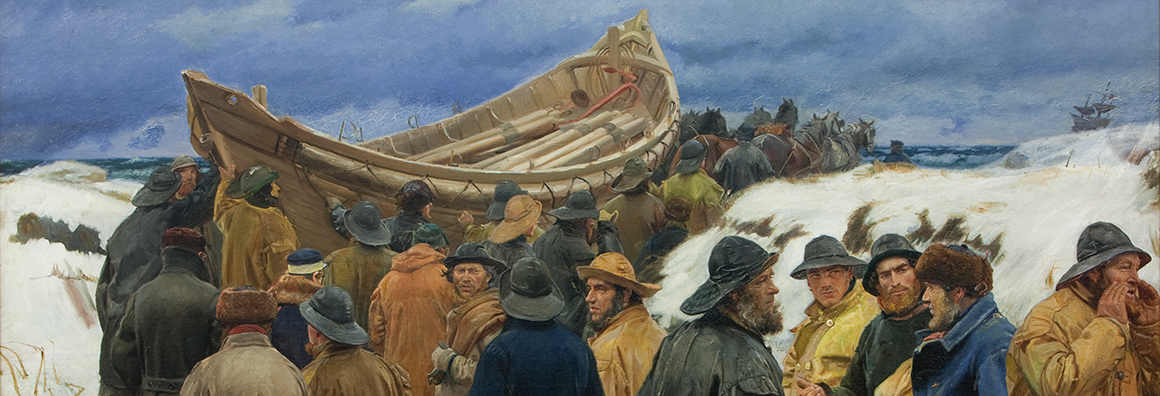
Archipelagic Imperatives. Shipwreck and Lifesaving in European Societies since 1800
The project aims to investigate the history of a particular moral norm—the imperative of saving lives from shipwreck and nautical distress—and on this basis to contribute to an improved understanding of the history of humanitarianism. On the basis of this investigation, the project also develops novel perspectives on the historical character and cultural situatedness of moral norms in general. Since 1823/24, humanitarian volunteer organizations for saving lives from shipwreck were established in Britain and the Netherlands that set up networks of lifeboat stations with national scope. Local, often transient initiatives had preceded these organizations since the 1760s. Until around 1870 other countries followed suit, in particular in Northern and Western Europe. Within a few decades, a mostly urban-bourgeois milieu succeeded in persuading the mostly rural, often impoverished coastal population to acknowledge the universal validity of an imperative according to which it was obligatory, under almost all circumstances and almost without regard to one’s own existential risk, to attempt the rescue of the shipwrecked. Previously, assistance to the shipwrecked had remained occasional. Neither technological innovations nor economic incentives explain the emergence of the new humanitarian movements. Hence, the analysis of moral culture becomes central.
The project examines the question of why and how the novel imperative emerged, how it was sustained, and what consequences emanated from it in culture and society. The investigation focuses on:
- the ‘moral economy’, the hybrid values embraced by the social movements for saving lives from shipwreck;
- the culturally given patterns of discourse and practice around lifesaving and shipwreck;
- the work lifeboat movements invested in achieving distinction from other moral and humanitarian ventures; and
- discussing the consequences of this historical analysis for positions in moral theory, especially meta-ethics.
The project focuses on the oldest forms of sea rescue movements in Britain, the Netherlands, France and Germany, from the early nineteenth into the mid-twentieth century. The project works with a diverse source base (archival and published documents, image sources) and a combination of methods (hermeneutic textual analysis, discourse analysis, iconography, media history, theoretical argument, intellectual history).
The analysis of this problematic aims more broadly at a theoretical understanding of the manner in which humanitarian moral norms emerge around mere single issues instead of general principles. This understanding will help to explain the lasting incoherence and fragmentation of humanitarianism as it has emerged historically, as well as its distance to quotidian moral discourse.
The research ties in with the project Humanitarian Imperatives. Saving Lives from Nautical Distress and Shipwreck in Modern Europe, which was funded by the German Research Foundation (DFG) from 2019 to 2020.
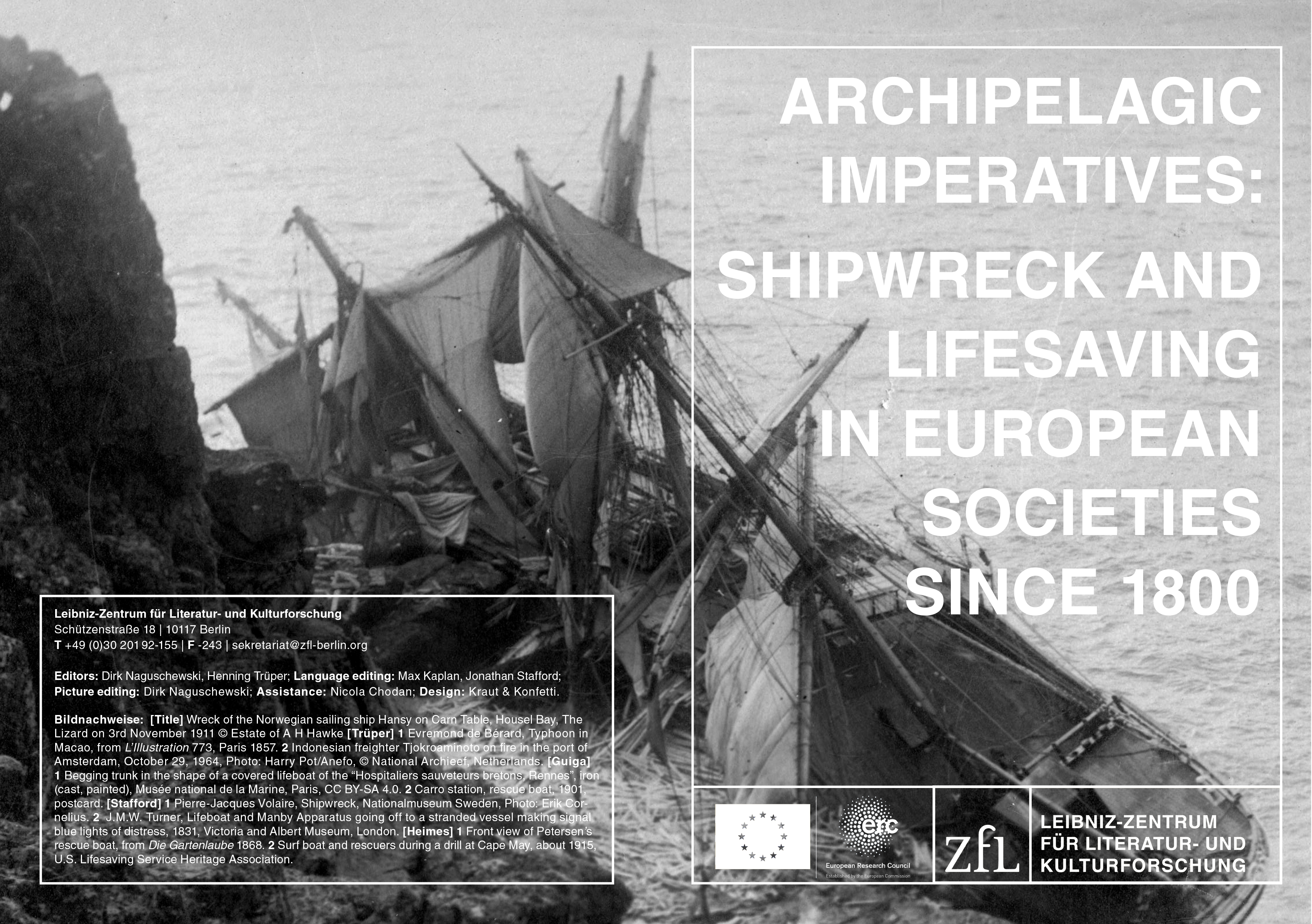 |
Brochure [PDF]: ARCHIPELAGIC IMPERATIVES Order your printed copy for free! |
Fig. above: Michael Peter Ancher: Redningsbåden køres gennem klitterne (1883, Detail), Source: Wikimedia
Subproject(s)
The Question Concerning Morality in Humanitarian Technologies
The rapid technological developments that entered humanitarian practice during the first half of the 20th century—motorization, radio, radar, and airborne rescue craft—fundamentally altered the rescue activities in place at the time. They facilitated entirely new procedures, having a profound impact on the possible scope of rescue operations. In addition to the practical correlates of these technologies, they also bore on the framework of values and norms, as well as on the constitution of lifesaving from shipwreck as a specific type of situation. The normative order of the humanitarian saving of lives from shipwreck intersected with political and military normativities in unprecedented ways and caused open or latent frictions and symbolic, discursive, and practical adaptations. This project therefore explored the shifting dynamics that play out in the relationship between moral normativity and technical innovations, as well as between generalizing principles and situational factors.
Humanitarianism and Sovereignty
Lifesaving is one of many activities regulated by sovereign states. Historically, sovereignty has seen multiple different definitions. However, since the 19th century, sovereignty has often meant the control of borders and the passing of laws within them. This subproject investigated the multifaceted links of the concept of sovereignty with shipwreck and lifesaving in the 19th century in two ways: First, the project explored the practice of sovereignty as a form of legal, (bio)-political, diplomatic, territorial, or in this case rather, maritime control, which became increasingly interlinked with humanitarian, commercial, and security issues. Secondly, it focussed on the figure of the sovereign who acted as supporter and patron of humanitarian initiatives, including lifesaving societies, and was vital to the creation and self-perception of these societies.
Historicising the Humanitarian Image: the Visual Culture of Shipwreck and the Moral Spectator
We are no strangers today to images of human suffering. Those affected by war, famine, disease, natural disaster, and other humanitarian emergencies fill the screens of our televisions, computers, and phones. Such images invite us to respond, as responsible citizen-subjects, in a register which is at once ethical and emotional—they elicit feelings of pity, compassion, empathy. The appropriateness of such a mode of engagement with the representation of suffering seems almost a given. Yet what are the historical origins of this topos? To what extent can we trace the discursive tropes which govern our moral and affective encounters with the humanitarian image—‘compassion fatigue’; the compulsion to look—through the iconography of suffering’s history?
The shipwreck at sea presents perhaps the most persistent subject matter in the secular iconography of suffering; from Dutch Golden Age painting of the 1600s; through the works of the 18th century French painter Claude-Joseph Vernet; to the proto-modernism of J.M.W. Turner. These images were produced concurrently with the rise of bourgeois social and cultural hegemony and the emergence of the ‘modern’ subject, in the terms of liberalism, the private individual. Increasingly, this was a figure whose constitution of their sense of self hinged upon a set of assumptions regarding their moral outlook on the world. Shipwreck images thus have much to tell us about the emergence of this modern subject, the history of emotions, and its relationship to morality.
Publications
The Rescuing Sovereign at Sea: Historical Perspectives on Maritime Law, Morals, and Politics
Forum in: International Journal of Maritime History
Epochenwenden
Zur Aktualität historischer Periodisierung
DOI 10.46500/83535880 (Open Access)
Social Imaginaries of Emergency Situations at Sea since 1800
Histoire social/Social History
with a preface by Patrice Gueniffey
Les blessés de Napoléon
Moral Seascapes
On the Ethics and Aesthetics of Maritime Emergency
Unsterbliche Werte
Über Historizität und Historisierung
Seuchenjahr
DOI 10.52438/avaa1002 (Open Access)
Nebiha Guiga
- Lifesaving at Sea and the Imperial State: A Portrait of the Initial Donors of the Société Centrale de Sauvetage des Naufragés (1865), in: International Journal of Maritime History 38.1 (2026), Forum: The Rescuing Sovereign at Sea: Historical Perspectives on Maritime Law, Morals, and Politics, ed. by Lukas Schemper and Henning Trüper, 46–66
- Social Imaginaries of Emergency Situations at Sea since 1800: Introductory Remarks, in: Nebiha Guiga, Henning Trüper, Aurélien Portelli (eds.): Histoire social/Social History 58.119 (2025): Social Imaginaries of Emergency Situations at Sea since 1800, 1–12 (with Henning Trüper and Aurélien Portelli)
- Imaginaires sociaux des situations d’urgence en mer depuis 1800 : remarques introductives, in: ibid., 13–25 (with Henning Trüper and Aurélien Portelli)
- Imaginaries of Lifeboating in the BBC Series Saving Lives at Sea: Narrative and Visual Constructions of Danger and Heroism in Historical Perspective, in: ibid., 171–191 (with Aurélien Portelli)
- Les récits du radeau de la méduse : l’histoire d’une situation extrême au prisme des violences et des sorties de guerre, in: Napoleonica. La Revue 2.46 (2023), 139–172 (with Aurélien Portelli)
- Between labour and moral duty: social conflicts, volunteer work and the moral economy of life-boating in the Royal National Lifeboat Institution (1850–1914), in: Labor History (2023)
- Soziale Lebenswelten und der allgemeine Humanitarismus, in: ZfL Blog, 6 Dec 2022
Alexandra Heimes
- From Shipwreck as Theatre to Morality as Technique: Two Emblematic Scenarios (Descartes, Leibniz), in: Jonathan Stafford, Henning Trüper, Burkhardt Wolf (eds.): Moral Seascapes. On the Ethics and Aesthetics of Maritime Emergency. Leuven: Leuven University Press 2024, 117–131
- Der Einsatz neuer Technologien im Humanitarismus und die ›Frage nach der Moral‹, in: ZfL Blog, 26 Jan 2023
Lukas Schemper
- Introduction: The Rescuing Sovereign at Sea, in: in: International Journal of Maritime History 38.1 (2026), Forum: The Rescuing Sovereign at Sea: Historical Perspectives on Maritime Law, Morals, and Politics, ed. by Lukas Schemper and Henning Trüper, 4–18 (with Henning Trüper)
- Sketching Configurations of Imperial Sovereignty through Nineteenth-Century Maritime Safety, in: ibid., 67–94
- Rescuing the National Body? The Role and Imaginary of Maritime Lifesaving in the Nazi State, in: Nebiha Guiga, Henning Trüper, Aurélien Portelli (Hg.): Histoire social/Social History 58.119 (2025): Social Imaginaries of Emergency Situations at Sea since 1800, 145–170
- Lifesaving, Sovereignty, and the Place of the Late Ottoman Empire in the European International Order, in: World History Journal 36.3 (2025), 345–376
- The International Moral Economy of Saving Lives at Sea in the Late Ottoman Empire, in: The International History Review 47.3 (2025), 428–447
- The League of Nations and the New Uses of Sovereignty, in: Thomas Bottelier, Jan Stöckmann (eds.): Instruments of International Order: Internationalism and Diplomacy, 1900–50. Manchester: Manchester University Press 2024, 35–54
- Retten, Töten oder Sterbenlassen? Schiffbruch und Seenotrettung in “Das Boot”, in: ZfL Blog, 16 Dec 2024
- Humanitarismus und Souveränität, in: ZfL Blog, 24 Nov 2022
- Schiffbruch der Zivilisation. Überlegungen zu einer Metapher, in: ZfL Blog, 16 Feb 2022
Jonathan Stafford
- A Deluge of Sea Images: Maritime Art and Temporal Crisis, in: ArtI@s Bulletin 14.1 (2025): The Same, But Not the Same: Understanding How Images Cross Boundaries and Endure, Article 7, 92–107
- Democratising the Sublime: Spectacular Danger and the Rise of Mass Leisure by the Sea, in: Coastal Studies & Society 4.2–3, 139–161
- Spectacle and Sympathy in the Origin Narratives of Lifesaving at Sea, in: Configurations 32.4 (2024), 375–398
- Introduction, in: Jonathan Stafford, Henning Trüper, Burkhardt Wolf (eds.): Moral Seascapes. On the Ethics and Aesthetics of Maritime Emergency. Leuven: Leuven University Press 2024, 9–30 (with Henning Trüper and Burkhardt Wolf)
- Placing the Moral Spectator: Realism, Perspective, and Affect in the Visual Culture of Shipwreck, in: ibd., 53–73
- Die visuelle Kultur des Schiffbruchs und der moralische Betrachter, in: ZfL Blog, 21 Nov 2022
Henning Trüper
- Introduction: The Rescuing Sovereign at Sea, in: in: International Journal of Maritime History 38.1 (2026), Forum: The Rescuing Sovereign at Sea: Historical Perspectives on Maritime Law, Morals, and Politics, ed. by Lukas Schemper and Henning Trüper, 4–18 (with Lukas Schemper)
- Humanitarian and Legal Rupture in Maritime Lifesaving since 1800, in: ibid., 95–115
- Social Imaginaries of Emergency Situations at Sea since 1800: Introductory Remarks, in: Nebiha Guiga, Henning Trüper, Aurélien Portelli (eds.): Histoire social/Social History 58.119 (2025): Social Imaginaries of Emergency Situations at Sea since 1800, 1–12 (with Nebiha Guiga and Aurélien Portelli)
- Imaginaires sociaux des situations d’urgence en mer depuis 1800 : remarques introductives, in: ibid., 13–25 (with Nebiha Guiga and Aurélien Portelli)
- Uncontrollable Noise: The Loss of HMS Nimble, 1834, in: ibid., 49–69
- Seenotrettung, in: Anna Pollmann, Christopher Möllmann (eds.): Schlüsselbegriffe gesellschaftlichen Zusammenhalts. Ein kritisches Vokabular. Göttingen: Wallstein 2025, 693–709
- Introduction, in: Jonathan Stafford, Henning Trüper, Burkhardt Wolf (eds.): Moral Seascapes. On the Ethics and Aesthetics of Maritime Emergency. Leuven: Leuven University Press 2024, 9–30 (with Jonathan Stafford and Burkhardt Wolf)
- Seascapes of the Drowned: Günther Uecker and the Iconography of the Dead of Shipwreck, in: ibd., 76–94
- Seenotrettung und Sitzungsprotokoll. Zur bürokratischen Verstetigung moralischer Normen, in: Anna Echterhölter, Caspar-Fridolin Lorenz, Tilman Richter (eds.): Apparate. Über Regierungsverfahren und Algorithmisierung. Berlin, Heidelberg: J.B. Metzler 2024, 155–162
- Nausicaa’s Cloth, in: Natalie Fritz, Paola von Wyss-Giacosa (eds.): Visual Reflections Across the Sea: A PIMo Collection of Essays on Mediterranean Crossings. Siena: IDEM 2023, 214–223
- Seenot im Archipel der Humanitarismen, in: ZfL Blog, 19 Dec 2022
- Embarkation for Abdera: Historicization in Nietzsche’s Second Untimely Meditation, in: Quaderns de Filosofia 9.1 (2022), 55–84
- Ikonologisches zum Verkehrsunfall, in: Gwendolin Engels et al. (eds.): Im Fuhrpark der Literatur: Kulturelle Imaginationen des Autos. Göttingen: Wallstein 2022, 61–72
- Insel und Archipel, in: Eva Geulen, Claude Haas (eds.): Formen des Ganzen. Göttingen: Wallstein 2022, 89–96
- Rettung der Toten vor dem Vergessen: Über Historisierung und Humanitarismus, in: KulturPoetik 22.1 (2022), 9–27
- Unter Einsatz des eigenen Lebens, in: leibniz 18: Reisen, 24 Aug 2022
- Species and Salvation: Theology of History in the Anthropocene?, in: Modern Intellectual History 19.1 (2021), 1–17
- Depth and Death: On History, Humanitarianism, and Mortuary Culture, in: History of the Present 11.2 (2021), 119–151
- Humanitäre und historische Brüche, in: Faltblatt zum ZfL Jahresthema 2020/21: EPOCHENWENDEN and in: ZfL Blog, 24 Nov 2020
Events
Lukas Schemper: Configurations of sovereignty in nineteenth-century trans-imperial projects of maritime security
Sciences po Aix, Espace Philippe Seguin, 31 avenue Jean Dalmas, 13100 Aix-en-Provence, France
Nebiha Guiga: “Does a cow fit on an Atlantic 85?” On the memory culture of a lifeboat station
Universiteit Leiden, Lipsius, Cleveringaplaats 1, 2311 BD Leiden
Sebastian Vehlken (DSM Bremerhaven/University of Oldenburg): “Seestatt”. Schwimmende Städte als maritime Medien
Leibniz-Zentrum für Literatur- und Kulturforschung, Eberhard-Lämmert-Saal, entrance Meierottostr. 8, 10719 Berlin
Jonathan Stafford: Everyday Leisure by the Sea: Democratising the Sublime
Fondazione Banco di Napoli, Via dei Tribunali 213, 80139 Napoli, Italy / hybrid
Lukas Schemper: Noblesse et patronage: le cas du sauvetage en mer
Bordeaux, France
History and the Future of Existential and Catastrophic Risk Studies
Cambridge, UK
Jonathan Stafford: Democratising the sublime: spectacular danger and the rise of mass leisure by the sea
Käte Hamburger Research Centre global dis:connect, Maria-Theresia-Str. 21, 81675 Munich
Henning Trüper: Moral and Legal Regimes of Saving Lives from Shipwreck since 1800
University of Bergen
Henning Trüper: On the History of Lifesaving medals and the Cultural Understanding of Value
University of Oslo, Georg Morgenstiernes hus, Rom 652, Blindernveien 31, 0851 Oslo, Norwegen
Jonathan Stafford: A Deluge of Sea Images: Exploring Global Crisis and Contemporaneity
GamMAH, Musée d’Art et d’Histoire, Promenade des Pins 5, 1204 Genève, Switzerland
The Rescuing Sovereign at Sea: Historical Perspectives on Maritime Law, Morals, and Politics
Leibniz-Zentrum für Literatur- und Kulturforschung, Eberhard-Lämmert-Saal, entrance Meierottostr. 8, 10719 Berlin
Jonathan Stafford: Of its Time? The Sea Image as Crisis and Contemporaneity
Akademie der Bildenden Künste, Akademiestraße 2–4, 80799 Munich
Jonathan Stafford: “Drowning is a very prosaic Arrangement”. Imperial Imaginaries in Nineteenth-Century Accounts of Shipwreck on the Steamship Voyage to India
Ruhr-University Bochum
Katastrophe und Zeitgenossenschaft: Zu den politischen Ikonographien des Schiffbruchs
Leibniz-Zentrum für Literatur- und Kulturforschung, Pariser Str. 1, 10719 Berlin
Henning Trüper: Binnenmeere und humanitäre Raumordnung: Zur Geschichte der Seenotrettung
Forschungsdepot, Eichstraße 13, 27572 Bremerhaven / online via Zoom
Lukas Schemper: Sovereignty, International Organization, and the Moral Economy of Saving Lives at Sea in the Ottoman Empire
The Hague, Netherlands
Moral Seascapes: Critical Perspectives
Kunsthistorisches Institut in Florenz – Max-Planck-Institut, 50122 Florenz
Lukas Schemper: Organizing Lifesaving at the 19th Century Bosporus
University of Turku, Finland
Henning Trüper: Moral economy and historical axiology: The Case of Saving Lives from Shipwreck
Håndbiblioteket, 5th floor Niels Treschows hus, Niels Henrik Abels vei 36, 0313 Oslo, Norway
Social Imaginaries of Emergency Situations at Sea Since 1800
Mines Paris – PSL, Building A, Room E112, 1, rue Claude Daunesse, 06904 Sophia Antipolis, France
Lukas Schemper: Sovereignty, International Organization, and the Moral Economy of Saving Lives at Sea in the Late Ottoman Empire
Department of History, University of Warwick, Faculty of Arts Building, University Road, Coventry, CV4 7EQ, UK
Henning Trüper: Modern Moral Meanings in Shipwreck Imagery
Senate House University of London, Malet St, London WC1E 7HU, UK
Johannes F. Lehmann: Politik der Rettung. Überlegungen zu einem politischen Narrativ jenseits von Sicherheit und Heil
Leibniz-Zentrum für Literatur- und Kulturforschung (ZfL), Schützenstraße 18, 10117 Berlin, 3. Etage, Trajekte-Tagungsraum
Henning Trüper: The Humanitarian Present in the Long Nineteenth Century
Tallinn University, Mare Building, Uus-Sadama 5, 10120 Tallinn, Estonia
Jonathan Stafford: Representing technological change at Sea: J.M.W. Turner and the steamship ‘revolution’
Helsinki Collegium for Advanced Studies, 24, Fabianinkatu 22, Helsinki, Finland
Henning Trüper: Sea spaces of humanitarianism around 1800
Helsinki Collegium for Advanced Studies, 24, Fabianinkatu 22, Helsinki, Finland
Henning Trüper: Some thoughts on global history and the global present
University of Helsinki, Think Corner Stage, Yliopistonkatu 4, 00100 Helsinki, Finland
Moral Seascapes. Modern Transformations of the Imagery of Shipwreck
Institut für Germanistik, Universität Wien, Universitätsring 1, 1010 Wien
Henning Trüper: Writing Work and Authorship in Historiography
Luxembourg Learning Centre, Belval Campus, 7, Ënnert den Héichiewen, 4362 Esch an der Alzette, Luxemburg
Mikko Huhtamies: From Salvage to Lifesaving in the 18th-Century Baltic
Leibniz-Zentrum für Literatur- und Kulturforschung, Schützenstr. 18, 10117 Berlin, Aufgang B, 3. Etage, Trajekteraum
Nebiha Guiga: Piles of limbs and human souls: Disgust and distancing towards wounded soldiers during the Napoleonic Wars
online
Nebiha Guiga: The emotions of surgery on Napoleonic battlefields
National Army Museum, London
Aurélien Portelli: Surviving to the machines: coping with extreme situations in a context of industrial disaster and shipwreck
Leibniz-Zentrum für Literatur- und Kulturforschung, Schützenstr. 18, 10117 Berlin, Aufgang B, 3. Etage, Trajekteraum
Henning Trüper: Über Moralisches Geschehen
Centre Marc Bloch, Friedrichstraße 191, 10117 Berlin
Henning Trüper: Rescuing the dead from oblivion: humanitarian morality and historical discourse
Universidad Carlos III de Madrid, Campus de Getafe, Edificio Ortega y Gasset
Henning Trüper: Rettung und Geschichte
online via Zoom
Media Response
Review by Achim Landwehr, in: Frankfurter Allgemeine Zeitung 56 (7 Mar 2025), 12
Contributions
12 Aug 2025
“Who Should We Rescue? The Morals of Maritime Emergency”
Episode of The Mariner’s Mirror Podcast by Sam Willis, with Jonathan Stafford, Henning Trüper, and Burkhardt Wolf, 12 Aug 2025
Audio: © The Society for Nautical Research
03 May 2021 Video
“Rettung und Geschichte”
Inaugural lecture by Henning Trüper at Zurich University
© Universität Zürich

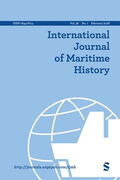
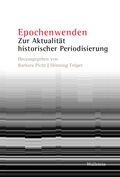
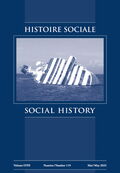

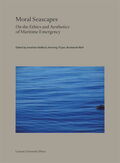
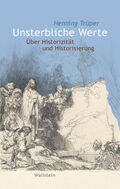

Social Worlds and the Generality of Humanitarianism
Life-saving as a humanitarian cause was only one part of a larger project of building a better society made up of better men in 19th century France. The focal point of this project was the tension between the initial general humanitarian goal of saving lives and the construction of a specific cause towards which it worked in practice, the lifeboat movement. Only by studying the networks of actors who took part in it and determining who were the donors and who were the lifeboatmen and what distinguishes one group from the other is it possible to understand how discourses pertaining to both humanitarian generality and the specific cause of lifesaving at sea, as well as the tensions between them, are articulated.
Drawing on the rich sources of information provided by the Annales of the French lifeboat society, the Société Centrale de Sauvetage des Naufragés (SCSN), founded in 1865, the study identified different groups of donors and examines the lifeboat society’s links to the French state as well as its inclusion in networks of maritime commerce on both a local and a global scale. Since sources relating to lifeboatmen are hard to find, a microhistorical approach was used to analyze the role that humanitarian generality played in their volunteering life.